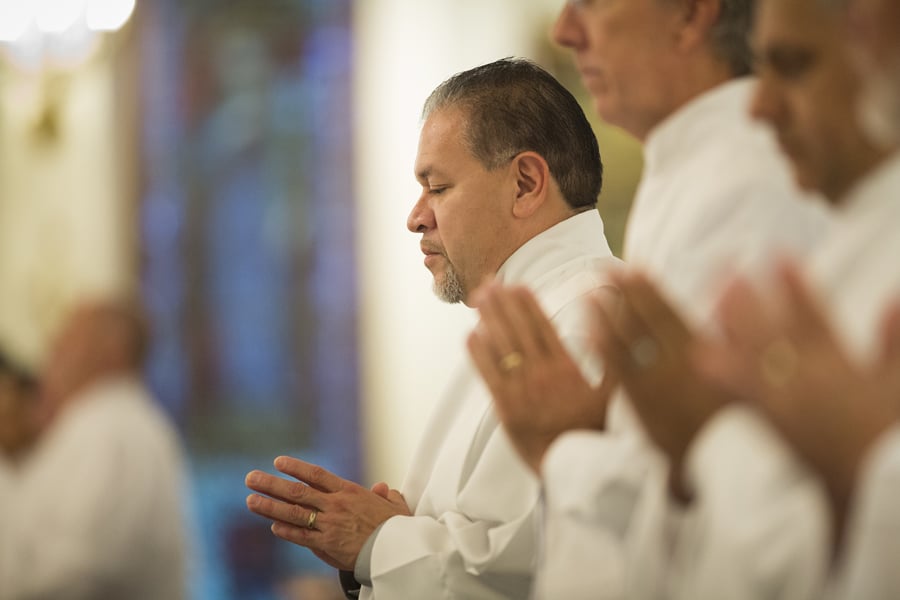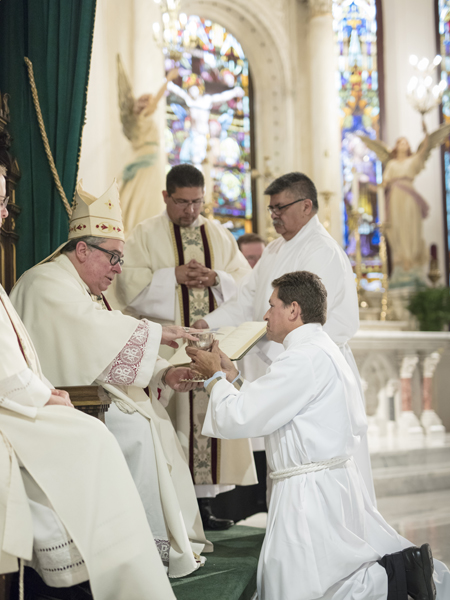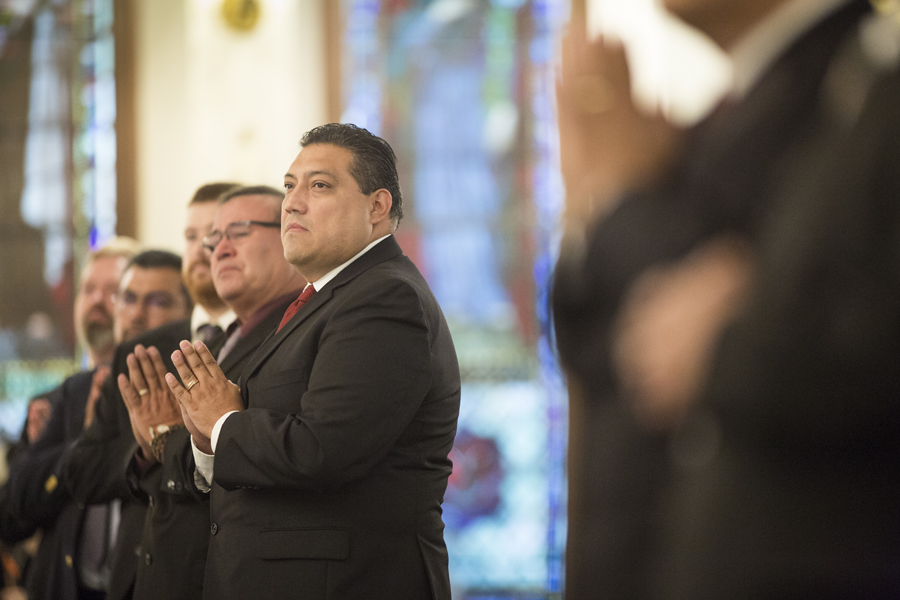Deacon candidates approach same goal from different angles

Fifteen deacon candidates were instituted as acolytes during a Mass celebrated by Bishop Michael Olson on August 11. Check out
FORT WORTH — Different paths twist and turn toward the hope of one ultimate destination and the unexpected is to be expected when it comes to diaconate formation, said three participants of the Aug. 11 Rite of Candidacy and institution of acolytes ceremony at St. Patrick Cathedral.
Although their journeys toward becoming permanent deacons differ, all three referenced a common denominator, that being the larger picture of their respective callings.
“God calls and it’s up to us to answer or not,” Deacon candidate David Bindel said. “Who knows what to expect when God calls you to serve Him? My attitude is I’m just glad He called and I continue to humbly serve as called to do.”
Bindel and 25 other men participated in the ceremony with 11 being admitted to candidacy and 15 being instituted as acolytes.
Bishop Michael Olson, who celebrated the Aug. 11 Mass, spoke of the importance of God’s call to ordained ministry, including the diaconate.
“He invites us, in ministry, to live life on His terms and not our own,” Bishop Olson said. “We’re invited to let go and receive Him one hundred fold and through receiving Him, He gives our true selves back to us.”
A deacon, like a priest, is an ordained position. However, most deacons maintain jobs outside of the Church, and many are married and have families.
That said, deacons are more than “glorified altar boys,” joked Deacon Don Warner, diocesan Director of Deacons.
“The beautiful thing about the diaconate is that they’re clergy but they have their foot in both worlds because they’re working and usually married,” Dcn. Warner said.
Deacons often assist parish priests during Mass and through other means such as visiting the sick but there’s more.
“Primarily they assist the bishop in any area of pastoral ministry where the bishop needs help,” said Juan Rendon, diocesan director of diaconal formation. “That could be in a parish, prison ministry, hospice and hospitals, or other outreach efforts such as Catholic Charities or homeless shelters.”
Deacons can also witness marriages, perform Baptisms, and distribute Communion among other duties.

Through five years of formation they undergo intensive scrutiny and training. The process involves stages of discernment including inquiry, aspirancy, and finally candidacy on the path to permanent formation. Arriving at the inquiry stage can take time, years in some cases.
“My wife and I lived in Southern California 25 years ago and were involved in the Church,” said Daniel Zavala of Holy Redeemer Parish of Aledo. “Several back then told me I would make a good deacon. I didn’t really even know what a deacon was then.”
Zavala, 54 now, jokes that it took a while for God’s plan to come to fruition.
“But, looking back in hindsight, I can see my whole life has been formed for this,” Zavala said. “And that’s a common theme I’ve heard from the other guys going through formation.
“I think back to when I was 13 or 14 and a group of us traveled to an orphanage in Tijuana with gifts and clothes, and working for a camp with mentally handicapped kids when I was 15, and remembering that my mother always told me life is a gift we have to give back.”
Zavala, like Bindel, characterized diaconate formation as a journey of discovery and surprises.
“It’s both more difficult and fulfilling at the same time than I can explain,” Zavala said. “You’re very busy. The intellectual formation is intense. What I found was I had to give my schedule up to God. In the end, I had to trust in God and say, ‘God, if this is what you want me to do then help me.’
“And it can be hard and scary at times. A lot of times we don’t want to recognize or acknowledge God’s call,” he continued. “The challenge and important thing when God calls you is to take that leap of faith.”
Deacon candidate Mark Gannaway agreed.
“There have been surprises almost daily along this journey,” the St. Bartholomew parishioner said.
Gannaway too said the idea of becoming a deacon, when first suggested, resided completely off his radar.
“It’s a journey,” Gannaway said. “Some days you feel called. Some days I’ve wondered if this is for me. It’s a five-year process and it needs to be. You need that journey along the way from the mountaintops to the valleys.”
Gannaway, 59, said he felt called several years ago but figured he was too old to be accepted into the program.
“I didn’t think they would accept me but went through the inquiry process and still at times thought this doesn’t sound right to me,” Gannaway said. “But I figured if this is God’s will then I will follow. I did the formal application after inquiry. Then, my wife and I went to Italy. We were in Rome at the Basilica of St. Lawrence [a deacon] when [Juan Rendon] called with formal notice, so that was a very powerful experience for both of us.”
The experience since has been incredible, Gannaway said.
“I had what I considered a great Catholic resume beforehand,” Gannaway joked. “I’d been active in the Church. Well, all that goes out the window once your formation starts and it’s all about following your heart and listening to God from that point.”

Eleven men were admitted to candidacy for the permanent diaconate during a Mass celebrated by Bishop Michael Olson on August 11. (NTC/Juan Guajardo)
Formation involves learning curves as well, he said.
“I was a corporate guy used to trusting in myself,” Gannaway said. “So learning obedience to God, learning to trust in God always was a process.
“I had never served in a homeless shelter before this. I figured I would be judgmental going in and wondered how I would react. But coming to know people in that position broke me down and helped change me.”
Bindel, a member of Sacred Heart Parish in Wichita Falls, said he likely got more out of his time volunteering in a hospice than the patients did.
“My mom died of Alzheimer’s four years ago,” Bindel said. “And getting to know and work with Alzheimer’s patients at the hospice definitely formed a bond of connection between me and them. It helped me realize in a big way that our lives are not about ourselves but about helping others.”
Such time of self-discovery and discernment, Dcn. Warner said, produces value both for the discerner and the Church.
“It’s a two-fold process,” Warner said. “The man himself discerning and the Church discerning if this man has the gifts the Church needs at this time.”
The need for deacons exists, Rendon said.
“We have about 85 in the diocese now, and they’re essential to the life of the Church,” Rendon said. “However, many will be retiring in the next three to five years.”
Formation is a family affair, Rendon said. Among the requirements is a letter of consent from the potential deacon’s wife.
“It’s important that the wife and family members be fully committed to and part of the formation process,” Rendon said.
Bindel agreed.
“It comes down to faith and your wife and family,” Bindel said. “I knew that was going to be important when I started this, and I’ve said and heard others say that our wives are a big part of this journey. We wouldn’t be here without them.”
Gannaway concurred.
“Like I said, this has been an incredible experience,” he said. “But I have two grown kids and six grandchildren and one thing I’ve always stressed to myself or anyone considering the diaconate is that you need to make sure to still have family time.”
